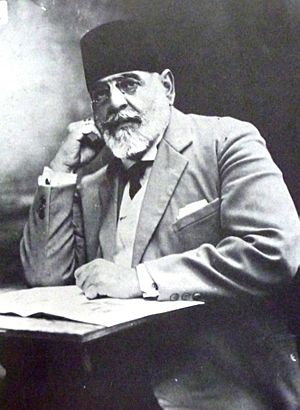Muslim-Christian Associations facts for kids
The Muslim-Christian Associations (also known as MCAs) were groups formed in Palestine around 1918. This was after the British army defeated the Ottoman Empire and took control of the area. These associations quickly joined together to form a larger group called the Palestine Arab Congress.
Their main goals were:
- To make Palestine an independent country.
- To oppose the Balfour Declaration, which supported the idea of a Jewish National Home in Palestine.
- To stop large numbers of Jewish people from moving to Palestine.
The Muslim-Christian Associations are seen as the first big step towards a Palestinian nationalist movement. This movement aimed for the self-rule and independence of the Palestinian people. However, by the end of the 1920s, these associations became less important. Their members were mostly from wealthy families, and they struggled to stop the growing influence of Zionism. They also found it hard to lead the public, who were becoming very worried about Palestine's future.
How They Started
The very first Muslim-Christian Association was created in Jaffa on May 8, 1918. Its president was al-Hajj Ragib al-Dajani. Many important people from Jaffa joined this group. The Jaffa association generally supported the British. This was partly because the city's important orange export business needed to stay on good terms with the British authorities. Also, the British military governor of Jaffa, Colonel Hubbard, had a good relationship with the Arab people there. Some even believe that Hubbard himself suggested forming the association.
In November 1918, to celebrate the anniversary of General Allenby's victory over the Turks, the Jaffa Association gave a statement to the governor. They expressed their trust in British promises of self-government, meaning they hoped to rule themselves. They also stressed that Palestine was an Arab country and spoke against Zionist claims to the land.
In May 1919, the Jaffa Association held a large meeting at the Zohar Cinema, with about 500 people attending. The main decisions made at this meeting were to demand independence, to recognize Palestine as part of a larger Syria, and to oppose Jewish immigration. The meeting became too chaotic after two hours, and the British military authorities closed it down.
Jerusalem's Associations
The first leader of the Jerusalem Muslim-Christian Association was Arif Pasha Dajani. On November 24, 1918, the British military governor of Jerusalem, Ronald Storrs, warned the mayor, Musa Kazem al-Husseini, and other important figures. He told them that being a member of the Muslim-Christian Association was not allowed if they wanted to work in government or politics.
The next year, from January 27 to February 10, 1919, the associations held a Congress in Jerusalem. Most of the people who attended were older and came from privileged backgrounds. This group was already starting to lose touch with the stronger, more radical opinions of the general public.
In March, the Jerusalem Association planned a protest for April 1, 1919, against the Zionist program. However, the authorities did not allow it, so the protest was canceled. Similarly, in May 1919, the Association wanted to send out a statement explaining their views before an international commission arrived. This statement emphasized that Palestine and Syria were united and rejected the idea of a Jewish National Home. However, it did say that Jewish people already living there had rights. General Allenby refused to let the statement be published, so it was withdrawn.
The British authorities did allow the associations to hold a two-day general strike on July 13–14, 1920. This strike protested against the British rule (called the mandate) and the behavior of the army.
Challenges and Decline
After the Nabi Musa riots, the Jerusalem Association released a statement on November 11, 1921. They protested that Arab protesters received much harsher sentences than Jewish people who were arrested. They also announced that they would not cooperate with British plans to demand money (security bonds) from people suspected of security offenses.
However, the group was losing trust with the public. People saw them as ineffective in stopping the increasing Zionist activities. The next month, an attempt by Zionists to secretly bring weapons into Palestine was stopped in Haifa.
The associations boycotted the ceremony for the first high commissioner, Herbert Samuel, on September 11, 1922. His arrival happened at the same time as Atatürk's victories against the Greeks. This made many Muslims very excited.
In the autumn of 1923, the Jaffa association stopped working. This happened after the city government agreed to accept the Rutenburg Scheme. This plan would provide electricity to the town but was opposed by the national Congress.
At their strongest point in 1920, there were about 40 Muslim-Christian Associations. They had around 3,000 active members.
Why Were They Opposed?
In 1922, new groups called Muslim National Associations started to appear. These groups were funded by the Zionist Executive, which was a Jewish organization. Their goal was to weaken the influence of the Muslim-Christian Associations and the Congress. Colonel Frederick Kisch was given the job of trying to get Arabs to support Zionism, with a budget of £20,000.
In 1923, the Jerusalem Muslim National Club was given £100 each month, and the Tiberias club received a one-time payment of £200. This money was also used to influence many important leaders and the mayors of Jerusalem, Nablus, Tiberias, and Beisan.
In 1923, the chief secretary to the high commissioner, Colonel Wyndham Deedes, ordered investigations into some of the leaders of the Muslim National Associations. The final report concluded that the people involved could not be trusted. It also said that this strategy was likely to have a negative effect. Both David Ben-Gurion and Ze'ev Jabotinsky were against this policy.
 | Jackie Robinson |
 | Jack Johnson |
 | Althea Gibson |
 | Arthur Ashe |
 | Muhammad Ali |


